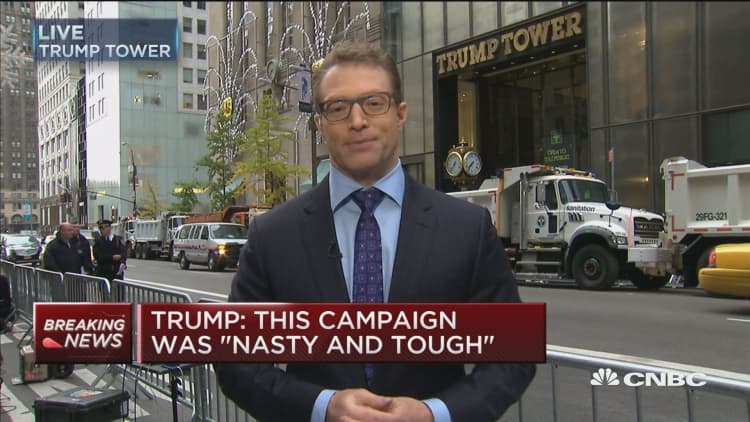The Trump Organization will be placed into a blind trust to prevent a conflict of interest when Donald Trump becomes president, Trump's attorney said. But legal experts say the plan is functionally, and perhaps legally, impractical.
In an interview Thursday with CNN, Trump attorney Michael Cohen said the president-elect is no longer interested in running his privately held multibillion-dollar Trump Organization or trying to leverage his presidency to grow his fortune or holdings.
Instead, his ownership of the company will be placed in a blind trust, and that his three oldest children will run it.
"We're going to do it, legally," Cohen said. "It's going to be placed into a blind trust. The children — Don, Ivanka, Eric, they're really intelligent. They're really qualified. … He's very comfortable with them at the helm and the people who will surround them."
Cohen admitted some people wouldn't be satisfied with the arrangement.
"Will we be able to appease everybody? The answer is no. No matter what the man does he can't appease everyone. But, everything will be done legally. He's not interested in the company anymore."
Still, lawyers say placing the organization into a blind trust would amount to little more than window dressing. A blind trust, by definition, prevents the owner from knowing what the company owns or holds. Since Trump built the organization, he knows each asset inside and out — from the 17 golf courses, 15 hotels and dozens of residential buildings.
What's more, having his kids run the company would still keep the business it in the family.
"Turning the business over to his kids will free up his time but it does nothing to resolve conflicts of interest," said Kenneth Gross, a political-law expert and ethics expert at Skadden, Arps, Slate, Meagher & Flom, who has advised many presidents.
"A creator of a blind trust is tagged with the knowledge of the assets put into the trust, and in terms of conflicts his children's interests are co-extensive with his self interest."
People familiar with the company say that the three Trump children will each manage a separate part of the company. Ivanka would run the hotels, Donald Jr. would run the golf properties and Eric would run the winery and new development projects.

Sources say that to avoid the appearance of trying to benefit from their father's power, the family will refrain from expanding too quickly or forging deals with overseas partners or companies that could appear as a conflict.
"They're going to just manage them and let the existing assets grow organically. But they're not going to do a lot of new deals or acquisitions," said one source close to the Trump family.
Using a blind trust was an issue when Michael Bloomberg was elected mayor of New York in 2001. Despite pressure to do so, Bloomberg did not put his 72 percent ownership interest of Bloomberg L.P. into a blind trust. But the city's Conflict of Interest Board ruled that Bloomberg had to recuse himself from daily decision-making at the company although it allowed him to be part of any talks about selling the media and data empire.
Still, Bloomberg's reach as mayor paled in comparison to the presidency. And since Trump's company has deals or partners in over a dozen countries, including South Korea, the Philippines, India, Brazil and the U.K., not to mention benefiting from tax provisions and regulations, the potential conflicts for Trump are far greater.
The impact of Trump's election on the Trump brand and revenues remains unclear. Over the course of the campaign, there were signs that the Trump brand had been damaged by his controversial comments and policies — especially among affluent consumers.
According to an analysis from Foursquare, which looked at visits from its more than 50 million users, the share of customer traffic going to Trump-branded properties fell 16.5 percent in September from a year earlier.
That decline followed a 7.1 percent year-over-year dip in August, a 14 percent drop in July and a 17 percent decline in June, Foursquare said.
Separately, a survey from Brand Keys found that the "Trump Premium" — or the added value of the Trump name — fell in the entertainment/TV space from 43 percent to 25 percent over the past year. For golf clubs and resorts, it fell from 40 percent to 30 percent, while it fell from 30 percent to 20 percent in real estate.
Now that he has won, however, his company and brand could get a sudden boost. One thing is likely: Trump's inauguration in Washington on Jan. 20 will not just make him the most powerful man in the world, it will also boost the profits of his new hotel down the street.


